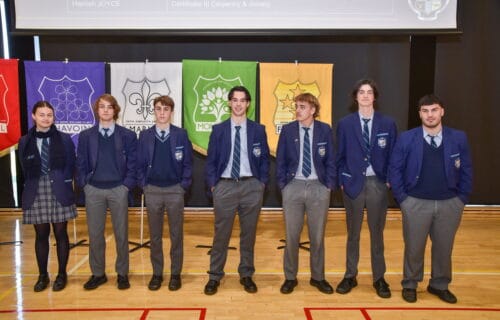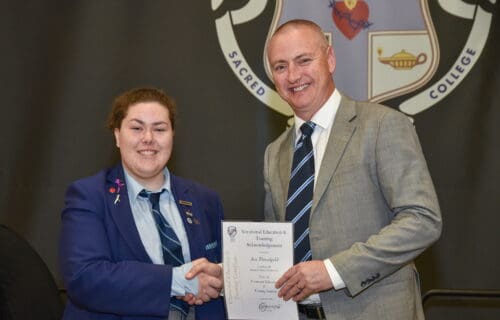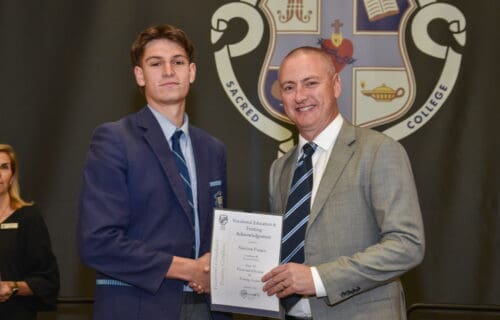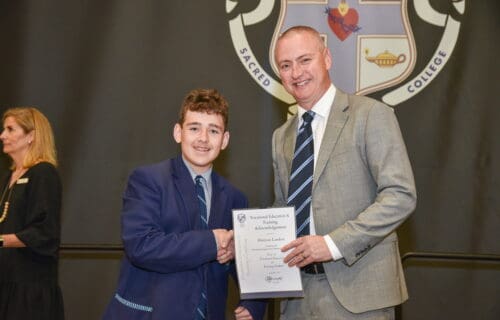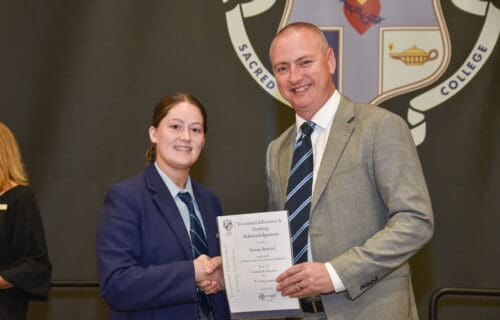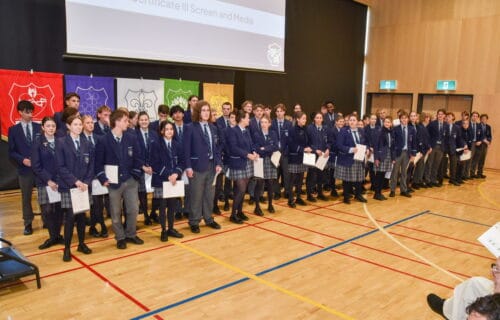
As they complete their final assessments, Year 12 students are looking at what they wish to do next year and beyond.
To our Sacred Heart College community
Year 12 reflection
Spring is in the air and we are once again at the point of the year where the Year 12 students are completing final assessments, some preparing for exams, and all are looking at what they wish to do next year and beyond.
I have a privileged position of being able to share conversations with students about what their future hopes and dreams are made of, and look at how students can make them happen. Future planning can elicit a whole range of emotions and feelings from nervousness and trepidation about leaving school and what they have known for most of their life, through to excitement and anticipation of what is to come; wondering about the next set of challenges and opportunities.
We are in a world where we must all embrace life long learning and adopt a positive mindset around our ability to continually learn and adapt. Our current school leavers have been challenged to do exactly that throughout their senior schooling years, particularly with the disruptive impact of COVID. They are now ready to move forward and embrace the next stage of their lives, knowing that their formal secondary schooling is over but their learning journey continues along with the friendships and bonds that they have formed whilst at Sacred Heart College.
Following are some quotes from our current Year 12 students who were asked to sum up the year in one sentence:
“I’ve never enjoyed school as much as I have this year. Even when assignments were due and life was stressful there was never anywhere I wanted to be more than at Sacred Heart with the other Year 12s who I know I’m going to miss next year.”
“This year has been challenging, but I have really enjoyed engaging with teachers and getting to know other students better and making new friends. The connectivity between all of the students has been great.”
“My Year 12 experience has been a whirlwind of challenges and growth. The pressure of finishing up strong with final exams around the corner is stressful. However this year has also been a year of self growth, making lasting friendships, and cherishing the last moments of high school. Despite the stress, I’ve further developed my self management, resilience, and the importance of pursuing my passions as I prepare for the next phase of my life.”
“To sum up Year 12 I’d say that it’s gone by super fast. It’s crazy to think we only have 20 days left, and I’m feeling a mixture of excitement for the future and sadness over this chapter coming to an end. This year has been a good balance of school workload and Year 12 events, and I feel I’ve made some long lasting friendships over this time. Although the stress of exams is approaching, I’m learning to pace myself and enjoy my finite time here.”
“For me the transition to Year 12 started with great excitement moving forward into my final year of schooling and also commencing my University journey through the Flinders Extension studies program. Although outside of school there have been numerous challenges which have caused me to pivot on important decisions, the supports offered by the school have helped immensely.”
Key dates
-
Work Experience for 2023
BEFORE CONSIDERING WORK EXPERIENCE, PLEASE BE AWARE OF THE FOLLOWING:
It is a legal requirement that prior to commencing Work Experience students are inducted in the following areas: Work Health and Safety Act 2012 SA, Children and Young People (Safety) Act 2017 SA, Equal Opportunity Act 1984 SA, Child Safety (Prohibited Persons) Act 2016 SA and Fair Work Act 2009 (Cth).
Adequate time (approximately 5 hours) should be allocated to cover these topics effectively and students need to demonstrate their understanding. This induction is done by the school and is consistent with our Duty of Care to ensure that no student is placed where they may not be safe physically or psychologically.
In addition to this, the Work Experience form must be signed by the student, work placement provider, parent/guardian (all arranged by the student) and finally the principal or delegate (arranged by the school). The original Work Experience Agreement form then becomes a legal contract which sets the school insurance cover in place and must be retained by the school.
The school must also provide a contact person who is responsible for each student for the duration of their placement.
Work Experience is a very valuable opportunity for most students however, it does take time to ensure that the above expectations are met. We are happy to accommodate students in the times allocated. Please do not cause yourself or the College embarrassment by making other arrangements and then asking for exceptions to be made.
Students who wish to do Work Experience during 2023 are advised that the dates are:
20 – 24 November (Optional Work Experience Year 12s only)
Deadline for paperwork: 20 October4 – 8 December
Deadline for paperwork: 3 NovemberPlease note this is general Work Experience only. Students undertaking a VET program will need to organise their VET work placement with the VET Office.
-
SCCE Exchange Webinar
26 September 2023
Preparing for your exchange program is an important part of the process and is vital to continued program success. At these online meetings, an experienced high school exchange advisor will share an overview of high school exchange programs with Southern Cross Cultural Exchange.
You’ll learn more about living with a host family and how studying overseas can help you develop confidence and independence… and gain a lifetime of memories.
Find out more here.
-
ISCD Interior Design virtual information session
ISCD’s interior design information sessions are a good way to explore the foundations of design and discover if a career in interior design is for you.
Join from anywhere and ask questions in real-time.
What to expect at this free 60 min info session:
- Explore the basics of interior design and the many roles and pathways you can take.
- Discover the difference between interior design and interior decoration.
- Find your own personal style by exploring different interior design styles.
- Learn the 7 design principles that govern interior design.
- Explore colour and its role within interior design.
- Learn all about their courses and how you can become a qualified interior designer in just 2 years via their virtual classroom.
- Meet a current ISCD student and hear first-hand about their experience.
Find out more here.
-
AIE Industry Experience Days
4 October 2023, Adelaide
AIE’s Industry Experience Day is a great opportunity for students in Years 10, 11 and 12 to learn about the local and international game development, 3D animation and visual effects industries. Students will get the opportunity to learn about the different pathways to get into the industry, what should be in a portfolio and will be able to get creative in practical workshops using industry-standard 3D animation and game development tools.
The sessions are run by industry professionals who have worked on some blockbuster games and films. Everything is provided for you to participate in the hands-on workshops and you will be using the same software that is used in the industry.
Find out more here.
-
Enter the World of Le Cordon Bleu – Career Residential, Adelaide
4 – 6 October 2023
Le Cordon Bleu are opening their doors to high school students in Years 11 and 12 to experience a ‘day in the life’ at one of the world’s leading culinary and hospitality institutions to provide a taste of what a future career in global hospitality will be like.
Meet lecturers and Le Cordon Bleu professionals, hear from industry experts, discover what Le Cordon Bleu hospitality management degree programmes involve and experience hands-on culinary arts with their chefs.
Find out more here.
-
Online Panel for girls interested in STEM
11 October 2023
We know that for young people and their family supporters, navigating a pathway into a STEM career can be challenging for a range of reasons. First, STEM offers diverse options in careers, some of which are unknown or misconceived. Second, information available can be outdated, limited or misinforming depending on access to information.
This online panel will host a range of people that are passionately involved across the STEM careers sector.
Find out more here.
Vocational Education & Training (VET)
Celebrating our VET students
The annual VET Assembly was held at Marcellin Campus on Wednesday 13 September. The College acknowledged more than 100 students who are on track to obtain a Certificate III through their VET studies this year. This included many Year 12 VET students, and a number of Year 11 students. In addition, we acknowledged all remaining Year 12 students who are studying VET at various Certificate levels.
This year there have also been 13 students who have undertaken school based apprenticeships and traineeships across a number of different industry areas in combination with their academic studies. These students were also acknowledged at the assembly.
The College announced the Year 12 VET student of the year, Zane Scripps, who has been undertaking Certificate III Rural Operations (Primary Production) for the past 18 months with Regional Skills Training.
Well done to Zane and all students on their fantastic achievements in VET this year!
Apprenticeships
National Timber and Hardware Association (NTHA)
NTHA are currently interviewing for apprenticeships in Carpentry, Bricklaying and Cabinet Making.
Carpentry and bricklaying apprentices will need a license and their own transport.
Please direct any inquiries to:
Scott Turner, Field Officer
NTHA Trainees & Apprentices Pty Ltd
M: 0417 225 823
E: scott.t@ntha.com.au
Spotlight on careers
-
What is it like to work in a zoo?
Zoos have many purposes that revolve around conservation, education, and entertainment. One of their primary roles is to safeguard and protect certain animal species through breeding and preservation programs. They also offer visitors, especially children, a unique opportunity to connect with and learn about various animals, their habitats, and conservation efforts.
Zoos also often contribute to scientific research, aiding in the study of animal behaviour, health, and environmental interactions. Modern zoos increasingly emphasise ethical and humane care, offering environments that mimic animals’ natural habitats and meet their physical and psychological needs.
Every zoo is different, but they do have some things in common:
- Loving animals is great – but you’ll probably also need to go above and beyond that to provide the highest quality care.
- Expect to work on your feet – many of the roles in a zoo require a high amount of physical work.
- They’re found everywhere – from big cities to rural expanses, zoos are popular all around the world.
Preserve, educate, and conserve Earth’s biodiversity
Zoos contribute to society by fostering education, conservation, and empathy for animals.Key Tasks
- Feed and care for animals
- Clean and maintain exhibits
- Run guided tours and educational programs
- Provide veterinary support and medical care
- Ensure public safety and manage crowds
- Research animal behaviour and health
- Provide enrichment activities for animals
- Fundraise and advocate for conservation.
You can find zoos in the arts and recreation services industry
Zoos are generally found in the arts and recreation services industry. There are lots of different types of zoos, including traditional zoos, safari parks, and specialised sanctuaries.You can expect regular hours and on-site work
Regular hours | Work on-site | Jobs in all areas | Strong job growthThe typical opening hours of a zoo can vary, but they generally range from around 9am to 5pm, although some zoos might have extended hours during weekends, holidays, or specific seasons. Some workers may need to come in and do work during the night when there are no visitors in the zoo.
The primary operations of zoos, such as animal care, exhibit maintenance, and visitor engagement, typically require on-site work. Animal care professionals, educators, maintenance staff, and other roles also need to be physically present at the zoo. While some administrative or research-related tasks might allow for remote work, on-site work is generally more common.
Zoos can be found across rural, regional, and metropolitan areas.
What do Makers do in a zoo?
Makers take on the role of creating, building, and maintaining the physical structures, landscapes, enclosures, and interactive elements that contribute to the wellbeing of the animals and the overall visitor experience.- Landscapers
- Maintenance Technicians
- Cleaners
- Horticulturalists
The role of a Linker in a zoo
Linkers help to enhance the visitor experience at a zoo, providing visitors with any information they might need to know. They are also responsible for promoting a zoo’s events and services to the public, and providing information on their current operations and projects.- Guest Services
- Marketing Managers
- Public Relations Officers.
Where you’ll find Coordinators in a zoo
Coordinators oversee schedules, logistics, and communication, while also managing the administrative and planning aspects that allow the zoo to function efficiently and effectively. They ensure that various departments, tasks, and resources work together to provide an enriching experience for visitors.- Development Directors
- Program Coordinators
- Events Managers
- Curators.
What do Informers do in a zoo?
Informers conduct in-depth research into different animals to help inform husbandry practices, nutrition, veterinary care, habitat development, and environmental enrichment. They also share knowledge, insights, and captivating stories about the animals, conservation efforts, and the natural world with visitors.- Animal Researchers
- Biologists
- Education Outreach.
The role of Innovators in a zoo
Innovators help to develop new solutions, whether in animal care, visitor engagement, or sustainable practices. They create new and improved exhibits and implement advanced technologies to enhance the experience for both the animals and visitors.- Enclosure Designers
- Landscape Architects
- Experience Designers
- Enrichment Specialists.
How do Guardians work in a zoo?
Guardians play a pivotal role in ensuring the safety, wellbeing, and health of both the animals and visitors. They do this by monitoring animal behaviour, maintaining enclosures, and adhering to safety protocols, helping to maintain a secure and enriching environment for all.- Zookeepers
- Veterinarians
- Safety Officers
- Conservationists.
How do we expect working in a zoo to change in the future
Working in a zoo is likely to undergo significant changes in the future, driven by advancements in technology, evolving societal values, and the increasing emphasis on conservation and sustainability.The integration of advanced technologies such as virtual reality, augmented reality, and interactive exhibits could enhance visitor experiences and education. Zoo staff may need to adapt to new tools for animal monitoring, data analysis, and communication with visitors.
Zoos will likely play an even larger role in conservation efforts, including captive breeding and reintroduction programs for endangered species. Conservation biologists, geneticists, and field researchers may become more integral to zoo teams.
As societal attitudes toward animal welfare continue to evolve, zoos may place a stronger emphasis on creating more naturalistic and spacious habitats, and on providing enrichment activities that mimic animals’ natural behaviours.
Zoos are also increasingly serving as hubs for scientific research, contributing to our understanding of animal behaviour, genetics, and ecology. Research positions, such as behavioural ecologists and wildlife biotechnologists, may become more prominent.
In South Australia students can study Bachelor of Science (Animal Behaviour) at Adelaide Uni or Flinders Uni.
Interesting stuff
-
Keeping your study momentum strong
As we get closer and closer to the end of the year, it’s easy to feel a mix of excitement and exhaustion. However, it’s crucial to keep your study momentum going strong until the very end. Here are some tips that will help you stay focused, motivated, and on track during this final stretch.
Set clear goals
Start by defining what you want to achieve by the end of the year. Whether it’s acing a final exam, completing a project, or raising your grades, having clear goals will give you a sense of purpose and direction.Break it down
Big goals can be overwhelming. Break them down into smaller, manageable tasks. This approach not only makes your goals less daunting but also allows you to celebrate small victories along the way.Stay organised
Keep your study materials and space organised. Having a clutter-free workspace and well-organised notes can save you precious time and reduce stress.Review regularly
Don’t wait until the last minute to review what you’ve learned. Regularly revisit your notes and materials to reinforce your understanding and prevent cramming.Stay healthy
Your physical wellbeing can directly impact your ability to study effectively. Make sure to eat well, exercise, and get enough sleep. A healthy body supports a focused mind.Reward yourself
Treat yourself for reaching milestones. It could be something small like watching your favourite show or enjoying a tasty snack. Rewards help keep you motivated and make the journey enjoyable.Seek support
Don’t hesitate to ask for help when needed. Whether it’s a teacher, a classmate, or a parent, seeking support shows strength, not weakness.Stay positive
Positivity goes a long way. Instead of dwelling on mistakes or setbacks, focus on what you’ve accomplished so far and the progress you’re making.Remember, it’s okay to have moments of fatigue or doubt. The key is to acknowledge these feelings and not let them derail your efforts. You’ve come this far, and with determination and consistent effort, you can finish the year strong.
-
Finding holiday jobs
If you want some work experience or to earn some cash over the holidays, now is the time to get busy finding and applying for jobs.
Holiday jobs are already being advertised and applications can be competitive – so starting your search and applying early could land you a great job, plus peace of mind to focus on the rest of the school year knowing you’re set for the holidays.
Here are some tips and tricks to help you find the perfect casual job.
Start local
You could look in the local newspaper, on local notice boards, and even in the shops nearby to see if anyone is advertising for casual staff or Christmas workers.Go straight to the source
Many businesses, particularly the larger ones, will always advertise any positions coming up in the Careers page on their website.So if you have a specific employer in mind or there are businesses near you who could be hiring, have a look on their website. You could also sign up for newsletters or new job alerts to make sure you don’t miss out on any future opportunities.
Here are some examples you might like to check out:
Search holiday job databases
Summer Jobs lists tonnes of Australian holiday jobs all in one place. You can search by the suburb you live in or where you’re looking for work.
Student Job Board is another good place to look. They specialise in jobs for university students, but some may apply for high schoolers too.
Season Workers is another site to check on the opportunities near you (or further away if you’d like to get away for the holidays instead).
Student Edge is another great place to look for casual or part time job opportunities over the holidays, or even during term time to help boost your savings.
You could also check on WORK180 – in their casual listings they advertise lots of potential roles (but note that this website is aimed towards women).
Prosple offer lots of different opportunities for young people, so it’s definitely worth checking out too.
Search on social media
Lots of businesses and organisations also advertise on social media when they have positions available.Facebook – you can check on specific job searching groups, community groups, or even go straight to the company’s page. If you do reach out to someone on Facebook, make sure your profile is locked down so you can limit who can access your personal information.
LinkedIn – you may need to create a professional profile.
Online job boards
Following are the top job search sites in Australia so you can stop searching and start applying. You can also apply directly for the job from many of these job sites and register for job alerts.Think outside the box
Anywork Anywhere advertise jobs all around the world, so if you’re unable to go overseas this year, perhaps you can keep it in mind for another time.Lots of businesses and organisations advertise jobs for backpackers too if you’re thinking of taking a Gap Year (or you could even apply for any positions near you). The Backpacker Job Board is one example of where to start your search.
Some helpful tips
- Check your eligibility (age, location, previous experience, etc.) before applying for any jobs
- See if any first aid, RSA, driving license, white card, or other requirements are necessary, and know how you can obtain them and provide evidence to employers
- Know the length of time and hours you’re willing to commit
- Work out how you’ll be getting there
- Read any terms and conditions before signing contracts
- Check out your workplace rights and responsibilities (FairWork is a great place to start)
- Have your resume updated and ready to go
- Be work ready – bank account, TFN, super account, etc.
-
Navigating the AI revolution – career paths for tomorrow’s high school graduates
If you’ve been watching the news lately, there’s been plenty of talk about AI (Artificial Intelligence) and its potential to take over a significant number of jobs. The way that it has been reported may have created a ripple of anxiety amongst young people still in high school or at university and parents as well.
But please bear in mind that what you hear about on the news probably isn’t the whole story. While it’s true that certain roles may be automated, it’s important to remember that in this era characterised by rapid technological advancements, the AI revolution is also going to open up a ton of other avenues for innovation and career opportunities.
Instead of worrying about what could change, let’s refocus on the positives and consider all the potential for new ways of working, as well as the new jobs that could be created.
Will robots take my job?
Hundreds of jobs that existed in the past are obsolete now, from carriage makers and chimney sweeps, to projectionists and clock keepers. And that’s not a bad thing; often the jobs were boring, hard manual work, or downright dangerous. Just like we’re experiencing now, the industrial and technological revolutions caused huge changes to the workforce, which in turn allowed the development of new jobs and the lifestyles we enjoy today.Although AI might reshape certain industries, it’s important to remember that the majority of careers won’t be entirely replaced, but rather transformed with some changes to the daily tasks.
Disclaimer: Statements on careers and courses included in this newsletter are not necessarily those of Sacred Heart College. i.e. The text of notices on courses and industry prospects may be taken directly from their correspondence/publicity material. Some material taken from Study Work Grow (South Australia Careers News).





